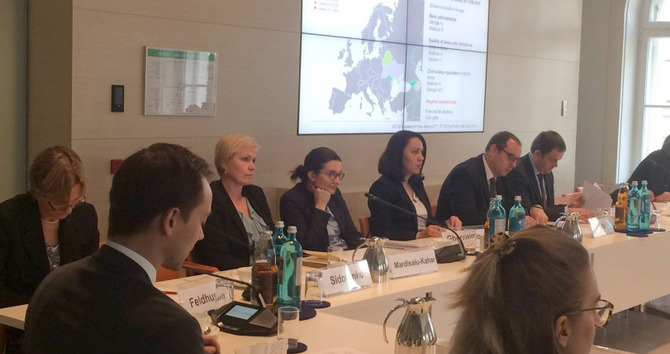Poland and Sweden initiated the "Eastern Partnership", decided by the European Council at the EU Summit in Prague in May 2009 in response to the "Union for the Mediterranean", the other multilateral initiative. The declared objective of the "joint undertaking of the Member States of the EU and its Eastern European partners," according to the summit declaration at the time, was to deepen the EU's relationship with Moldova, Ukraine, Belarus and the South Caucasus republics of Armenia, Azerbaijan and Georgia.
![[Translate to English:] Teilnehmer des Stakeholder-Dialogs während der Diskussion](/fileadmin/files/_processed_/1/a/csm_2582989313_be_e84d679d4c.jpg)
Bertelsmann Stiftung
A decade of the European Union's Eastern Partnership – Evaluation of the present, shaping the future
The challenges in Eastern Europe relate closely to questions of coexistence in the EU. On May 29, the Bertelsmann Stiftung’s "Future of Europe" program therefore invited participants to a dialogue on the "eastern dimension of the EU," as part of regular cooperation between the Foundation and the EU presidencies, which Romania currently holds.
Content
The Eastern Partnership is based on the shared commitments to “the principles of international law and to fundamental values, including democracy, the rule of law and the respect for human rights and fundamental freedoms, as well as to market economy, sustainable development and good governance.”
The tenth anniversary provided the opportunity to analyse the successes and shortcomings of the Eastern Neighbourhood Policy with political decision-makers, experts and practitioners from business; and to think about more creative force for the "eastern dimension of the EU" (as Poland called the Eastern Neighbourhood in 2004 already).
The experience of the past ten years shows that ownership of reforms is in the hands of the partner countries, not the EU. Political will from the partner countries themselves is key.
Regional approach for a heterogeneous region?
The EU's response to the traditionally heterogeneous region is tailor-made treaties: association agreements and free trade areas aimed at economic integration for Moldova, Ukraine and Georgia, the countries that would favour EU membership the most; a partnership agreement without free trade for Armenia, seeking closer relations with the EU while wanting to remain a member of the Eurasian Economic Union. Belarus and Azerbaijan would prefer not to change the political status quo, at least as long as they do not see their independence threatened by Russia.
At the first roundtable "The EU and its Eastern Neighbourhood - Assessing the Present, Strategy for the Future" the question to which extent the EU is achieving its goal of strengthening political and economic transformation was discussed controversially. Nonetheless, there was one point on which the discussants agreed: there was no way around adding a security policy component to the European Neighbourhood Policy for Eastern Europe in the long term. It is irrelevant that the EU did not conceive the Eastern Partnership as a geopolitical strategy, because Moscow perceives it as such.
The central role of the EU as a partner of matured societies and business
Only a strong and fair state provides the framework for social and economic modernisation. For this reason, the EU must also provide bilateral support to states willing to reform, such as Ukraine, Moldova and Georgia. Even if the reforms, especially in the area of the rule of law, have stalled or regressed, it is important to promote them further and demand results consistently.
The future of Ukraine will not only be decided in the Donbass, but also in Kyiv.
A Discutant of the Expert Roundtable
The EU is now cooperating well with its neighbours' civil societies when it comes to identifying and jointly solving problems. The joint pressure of the EU from outside and civil society from within is so important, because fair political competition will only emerge in the long term. The 'old' elites in particular are used to filling out democratic institutions only in form and imitating reform rather than actually implementing.
Such support, however, presupposes the political will in Brussels and the EU Member States to keep their Eastern neighbours on the list of priorities and to recognise and accept the complexities of implementation. No EU policy could have radically changed the former Soviet republics in just a few years. It takes a long time to break up the capture of states by self-serving elites. A central point is unity within the EU. Also, the integration of particularly progressive neighbours into EU projects such as the Energy Union or common defence policy can only succeed if the EU members have the strategic will to shape the EU's future and implement European cohesion externally.
Two competing projects of economic integration
Sustainable development was the focus of the second Roundtable "Eastern Partnership - A Factor for Economic Development". The Deep and Comprehensive Free Trade Agreements are in any case a step in the right direction, all speakers said, because the integration into the European system associated with them strengthens the framework for fair competition and thus for innovation and growth in the partner countries. The EU, however, must conscientiously accompany the implementation of the complex association agreements. Earlier analyses of the DCFTAs identified high costs in the short term that only the long-term benefits would compensate for.
Overall, here too the neighbours are in a field of tension between Eastern and Western influence – the free trade zones with the EU contrast with the Eurasian Economic Union, which does not allow its members Armenia and Belarus free trade with the EU and has in the past imposed economic sanctions on non-members.
After about one and a half years of internal political upheaval, it is still too early to assess whether the Comprehensive and Enhanced Partnership Agreement CEPA concluded with Armenia could form a “bridge” between the blocs.
One conclusion applies equally to both European and Eurasian integration: It has been shown in the past that corrupt rulers discredit the integration models for which they, often only supposedly, stand.
Foreign investors want legal certainty
The EU is already the strongest economic partner of the Eastern Partnership countries, with the exception of Belarus. However, there has been no significant increase in foreign direct investment so far, because major investors in particular attach importance to the rule of law that protects the enforceability of their property rights. Changes here are also a prerequisite for the young and talented not to emigrate from their countries, but to find employment opportunities at home and help shape the modernization processes there.
At the same time, some positive developments are already beginning to emerge. For example, the growing IT service sector in Ukraine but also in Belarus represents an opportunity for SMEs to gain a foothold without directly competing with the still predominantly monopolistically organised economic elite.
The relatively slow progress of the Eastern neighborhood countries also shows in the Bertelsmann Transformation Index (BTI). The BTI analyzes and compares transformation processes toward constitutional democracy and a market economy flanked by social policy worldwide. It is published every two years and assesses the quality of democracy, the market economy and political governance in 129 countries.
The Eastern Partnership Countries in Transition
Political Transformation
Economic Transformation
Governance Transformation
Outlook: Continuing the positive reform agenda!
The political will of the countries themselves may be the decisive factor, but unfortunately, political decision-makers on the one hand and maturing societies and progressive economic forces on the other are not automatically and from the outset in the same camp. If, however, the EU continues to support the consensus of the reform-oriented forces, and strengthens the DCFTA countries in areas where there is a lack of state capacity, the outlook for the next decade of the Eastern Partnership is more positive. There is great social and economic potential in the countries of the Eastern Neighbourhood, the participants predominantly summed up the results of both rounds of the conference.



![[Translate to English:] Gruppenbild mit tunesischer Delegation, den georgischen und ukrainischen Verhandlungsführerinnen Tamara Kovzeridze und Veronika Movchan sowie den Vertretern der Bertelsmann Stiftung Miriam Kosmehl und Christian-Peter Hanelt](/fileadmin/files/_processed_/0/7/csm_1920756516IMG_0123_e448663d83.jpg)
![[Translate to English:] Menschen am Tisch](/fileadmin/files/_processed_/7/5/csm_514562722IMG_0054_ecd98f6101.jpg)


